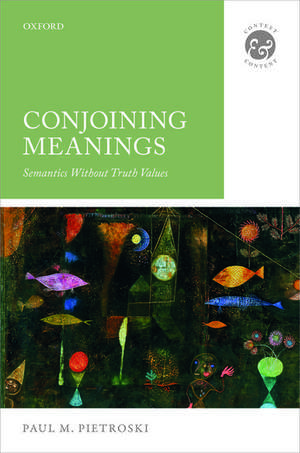Conjoining Meanings: Semantics Without Truth Values: Context & Content
Autor Paul M. Pietroskien Limba Engleză Hardback – 26 apr 2018
Preț: 497.57 lei
Preț vechi: 564.40 lei
-12% Nou
Puncte Express: 746
Preț estimativ în valută:
95.21€ • 99.41$ • 78.62£
95.21€ • 99.41$ • 78.62£
Carte tipărită la comandă
Livrare economică 04-10 aprilie
Preluare comenzi: 021 569.72.76
Specificații
ISBN-13: 9780198812722
ISBN-10: 0198812728
Pagini: 404
Dimensiuni: 164 x 242 x 29 mm
Greutate: 0.76 kg
Editura: OUP OXFORD
Colecția OUP Oxford
Seria Context & Content
Locul publicării:Oxford, United Kingdom
ISBN-10: 0198812728
Pagini: 404
Dimensiuni: 164 x 242 x 29 mm
Greutate: 0.76 kg
Editura: OUP OXFORD
Colecția OUP Oxford
Seria Context & Content
Locul publicării:Oxford, United Kingdom
Notă biografică
Paul M. Pietroski (Ph.D. MIT) is Distinguished Professor of Philosophy and Cognitive Science at Rutgers University. He taught previously at McGill University and the University of Maryland. His research addresses questions concerning linguistic meaning and its relation to cognition: what are word meanings; how are they related to human concepts and our capacity to understand complex expressions; and how do children acquire this remarkable capacity? He is the author of Causing Actions, Events and Semantic Architecture, and numerous articles on topics that span philosophy, linguistics, and psychology. He has held visiting positions at Harvard and the École Normale Supérieure.







